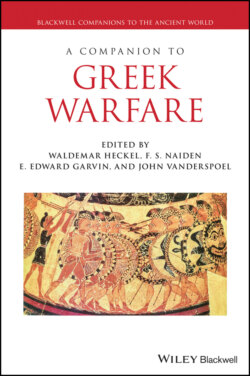Читать книгу A Companion to Greek Warfare - Группа авторов - Страница 36
Introduction
ОглавлениеAlthough the Persian invasions galvanized many of the Greek city-states in uniting, this new-found harmony was short-lived and shortly afterward the Greeks reverted to their traditional state of perennial internecine warfare, with one important difference—the stakes were now much higher. Instead of relatively small-scale campaigns where citizen armies challenged their neighbors for control of scarce agricultural land (particularly in border territories) in a single pitched infantry battle,1 the Greek world was now divided into two competing spheres of influence, ensuring that henceforth internal wars were to become lengthy large-scale campaigns.
In response to the Persian threat, the Athenians developed the largest navy in the Greek world. Even more importantly, the Persian Wars instilled into the Athenians the mindset that not only could they protect their fellow Greeks from any possible Persian repercussions, but that as the saviors of Greece they were entitled to exercise hegemony over them (Aesch. Pers. 233–234; Hdt. 7.139; Thuc. 1.73–75.1, 5.89, 6.83.2). The foundation of the Delian League (so named after the organization’s headquarters on the island of Delos, site of an important pan-Ionian sanctuary) in 478/477 afforded the Athenians leadership over willing allies.2 Athenian control over the allied naval forces as well as the annual tribute of those allies who did not contribute ships (Thuc. 1.96.2) soon gave them the ability to rival the Spartans’ military dominance in Greece through leadership of the Peloponnesian League. As Thucydides observes (1.18.2–3), not long after the Persian Wars the Greek world became divided between two great powers, Athens on the sea and Sparta on land, each heading a coalition of allies. The military polarization between the two soon shaded into the realm of ideology, as the Spartans tended to favor oligarchic governments and the Athenians democratic ones. When the uneasy alliance forged during the Persian Wars began to fray, the stage was set for a major confrontation between Athens and Sparta, each of which now possessed the manpower and the resources to wage extensive year-round campaigns far beyond their borders throughout the Greek world.
